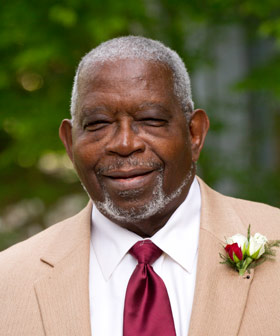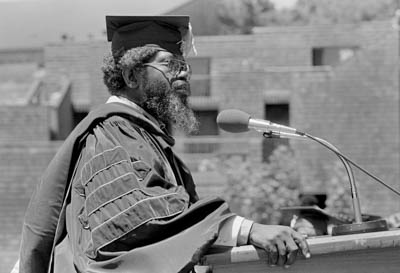Campus News
Oakes Founding Provost J. Herman Blake receives lifetime achievement award
Professor Emeritus of Sociology and Founding Provost of Oakes College J. Herman Blake is being recognized by the American Sociology Association for his distinguished career spent advancing access and equity in education.


Professor Emeritus of Sociology and Founding Provost of Oakes College J. Herman Blake will receive the Distinguished Career Award for the Practice of Sociology at the American Sociology Association’s virtual annual meeting on August 8. The award recognizes Blake’s lifetime achievements in advancing the field of sociology through the positive impact of his work.
Both during his time at UC Santa Cruz and in his subsequent roles, Blake’s career has often centered on access and equity in education.
“The important thing for me was then and is now reaching out beyond the academy and motivating and inspiring people who have not been considered as worthy of a higher education and seeing them take advantage of the opportunity and grow beyond where they ever anticipated,” he said.
Blake grew up as one of seven children living in poverty outside of New York City, and one of the ways that his family supported his success was by placing a great emphasis on education. He went on to attend New York University for his undergraduate education and UC Berkeley for his master’s and doctoral degrees. In 1966, he joined the sociology faculty at UC Santa Cruz as the university’s first Black faculty member.
Blake then played a leading role in the development of Oakes College, which was founded in 1972 to promote cross-cultural learning and support the academic achievement of students from historically marginalized communities. He served as founding provost of Oakes College until 1984, alongside a group of faculty members representing a diverse array of racial, ethnic, and gender identities and academic disciplines. Blake says those early experiences at Oakes College have remained a bright spot in his career.
“The faculty at Oakes College was simply extraordinary,” he said. “Interacting with them—in a way leading them, and in a way following them—helped to shape my understanding of who I was and what we were doing academically. When we brought our unique qualities and experiences together and began to speak from those foundations and direct our view toward the vision that we had for ourselves and our students, it led to an academic, social, and intellectual culture that was extremely unique.”
Following his 18-year tenure at UC Santa Cruz, Blake took on many distinguished roles, including as president of Tougaloo College, vice chancellor at Indiana University, director of African American Studies at Iowa State University, the Eugene M. Lang visiting professor for issues of social change at Swarthmore College, founder of the Sea Islands Institute at the University of South Carolina Beaufort, and the inaugural humanities scholar in residence at the Medical University of South Carolina (MUSC).
In 1984, he was part of a national study group that produced the highly influential Involvement in Learning report for the U.S. Department of Education, which offered recommendations for improving undergraduate education that have since been utilized by colleges across the country. He was also chairman of the board of directors for Save The Children and worked with the organization for 19 years to uplift young people around the world.
Blake has published extensive academic papers on students of color in higher education and Black militants in urban environments, and he was the founding commissioner and inaugural executive director of the Gullah Geechee Cultural Heritage Corridor Commission, established by the U.S. Congress to recognize the unique heritage of Gullah communities in coastal areas from Wilmington, North Carolina, to Saint Augustine, Florida. Blake has also received two presidential medals.
Looking back on it all, he says the three main pillars of his life have always been academics, service, and family. For the past 25 years, he has been married to Emily L. Moore, Ed.D., retired former associate dean for academic and faculty affairs in the MUSC College of Health Professions.
These days, Blake says he is writing a book about Gullah culture and a separate memoir of his experiences at Oakes College, while also pursuing other creative projects in his retirement. Of all his achievements over the course of a highly decorated career, Blake says the role he has played in supporting student success will always be among his biggest points of pride.
“One of the things I’m really proud of is that I’m presently working with former students, some of whom have become peers of mine,” he said. “When I think back over my experience, it has often been about creating analytical perspectives that help people see ways they can transcend whatever circumstances they encounter, and I am always very excited to see that happen.”